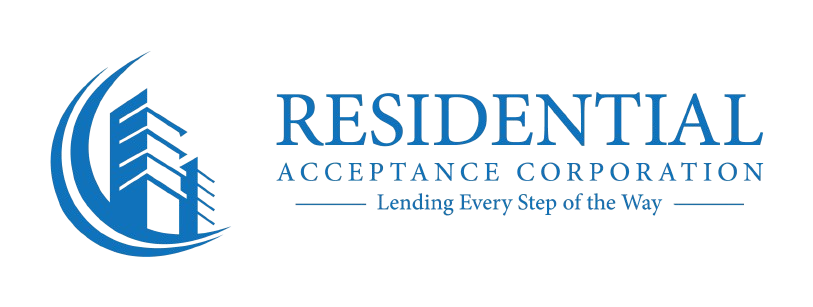Stepping into the world of homeownership is an exhilarating milestone, but the path to your front door is paved with important financial decisions. For first-time buyers, choosing the right mortgage lender is arguably the most critical step. It’s not just about securing a loan; it's about finding a partner who can offer the guidance, support, and loan products tailored to your unique situation. The sheer volume of options can feel overwhelming, but a dedicated specialist can make all the difference. This guide is designed to cut through the noise.
We will explore the key factors that define the best mortgage lenders for first time home buyers—from diverse loan programs and down payment assistance to personalized service and digital convenience. Our goal is to empower you with the knowledge to select a lender that not only finances your home but also makes the entire process clear, manageable, and successful. Instead of providing a ranked list, we will present a detailed look at top options, highlighting how each one caters to different first-time buyer needs.
Throughout this comprehensive review, we will provide a special focus on why a dedicated, full-service lender like Residential Acceptance Corporation (RAC) stands out with its personalized approach. For each platform discussed, you will find direct links, screenshots, and an analysis of their pros, cons, and best-use scenarios. This structured comparison will help you confidently identify the ideal lending partner for your homeownership journey, whether you are a prospective buyer, a real estate agent seeking reliable partners, or a homeowner considering a refinance. We’ll equip you with the insights needed to compare lenders effectively and secure the right financing for your first home.
1. Residential Acceptance Corporation (RAC Mortgage)
Residential Acceptance Corporation (RAC Mortgage) establishes itself as a premier full-service mortgage lender, offering an exceptionally tailored and comprehensive home financing experience. For those navigating the complexities of their first home purchase, RAC provides a robust framework of support, combining personalized guidance with impressive efficiency. This makes it an outstanding choice for anyone seeking the best mortgage lenders for first-time home buyers, ensuring a clear and confident path to homeownership.
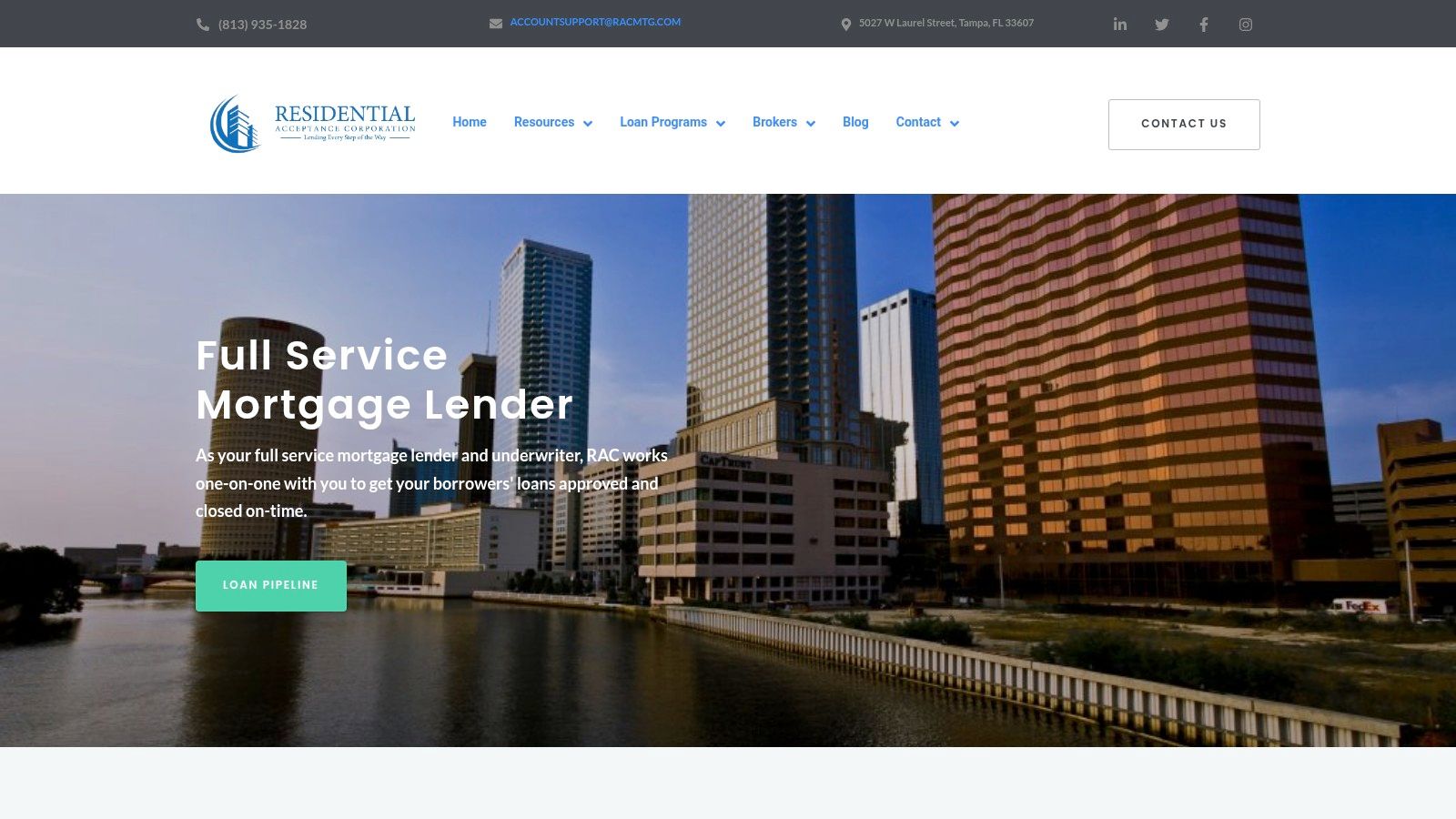
What truly distinguishes RAC Mortgage is its dual commitment to speed and personalized service. The company proudly closes loans within a remarkable 18 to 20-day window from the receipt of a complete file. This accelerated timeline is a significant advantage in competitive housing markets, empowering first-time buyers to present more compelling offers and move into their new homes sooner.
Key Insight: RAC’s accelerated closing timeline (18-20 days) gives first-time buyers a crucial competitive edge. This speed, combined with expert guidance, transforms a potentially stressful process into a streamlined and manageable experience.
Comprehensive Loan Options for Every Buyer
RAC Mortgage excels by offering an extensive portfolio of loan products, ensuring that nearly every aspiring homeowner can find a suitable financing solution. This versatility is particularly beneficial for first-time buyers who may have unique financial profiles or need access to specialized government-backed programs.
Key Loan Programs Include:
- FHA Loans: Ideal for buyers with lower down payments and flexible credit requirements.
- FNMA (Fannie Mae) Conventional Loans: A standard option for borrowers with strong credit and stable financial histories.
- USDA Loans: Perfect for eligible buyers in rural and suburban areas, often requiring no down payment.
- VA Loans: An exclusive benefit for service members, veterans, and eligible surviving spouses, typically with no down payment or private mortgage insurance.
- Non-Agency/Non-QM Loans: A critical resource for self-employed individuals, investors, or those with non-traditional income documentation who may not qualify for conventional loans.
This diverse selection demonstrates RAC's ability to serve a wide audience, from the traditional W-2 employee to the gig-economy worker, making them one of the most adaptable and best mortgage lenders for first-time home buyers.
Why RAC Mortgage Stands Out
| Feature | Practical Benefit for First-Time Buyers |
|---|---|
| Personalized One-on-One Guidance | You are assigned a dedicated professional who walks you through every step, from application to closing. This direct support demystifies the process and helps you avoid common pitfalls. |
| Proactive Market Monitoring | The RAC team continuously analyzes credit policies and economic trends. This means the advice you receive is always current, helping you secure the best possible terms in a fluctuating market. |
| Advanced Digital Resources | A seamless online platform simplifies document submission and tracking. You can manage your application efficiently from anywhere, complementing the personal support you receive. |
Navigating the RAC Mortgage Process
To get started, prospective buyers can visit the RAC Mortgage website and initiate contact. While specific rates and fees are not publicly listed, this is by design. RAC customizes its loan packages based on individual circumstances, ensuring you receive a tailored quote rather than a generic estimate. The user-friendly interface makes it easy to connect with a loan officer who will provide a clear, no-obligation consultation.
Pros:
- Wide range of loan products accommodates diverse borrower profiles.
- Exceptionally fast loan closing times, typically 18 to 20 days.
- Personalized, one-on-one customer service from an experienced team.
- Proactive monitoring of market trends provides up-to-date, reliable advice.
- Strong support for mortgage brokers with dedicated tools and underwriting.
Cons:
- Pricing is not publicly listed, requiring direct contact for specific rates and fees.
- Physical headquarters in Tampa, Florida, may limit in-person service options for nationwide clients.
Learn more by visiting their website: https://racmortgage.com
2. A Focus on Digital Convenience
Some mortgage providers have built their reputation by pioneering a fully digital, streamlined application and closing process. For first-time home buyers who are comfortable with technology and value speed, this type of platform can offer an incredibly efficient path to homeownership. Its major appeal lies in its ability to take a traditionally paper-heavy, time-consuming process and make it accessible from anywhere, at any time.
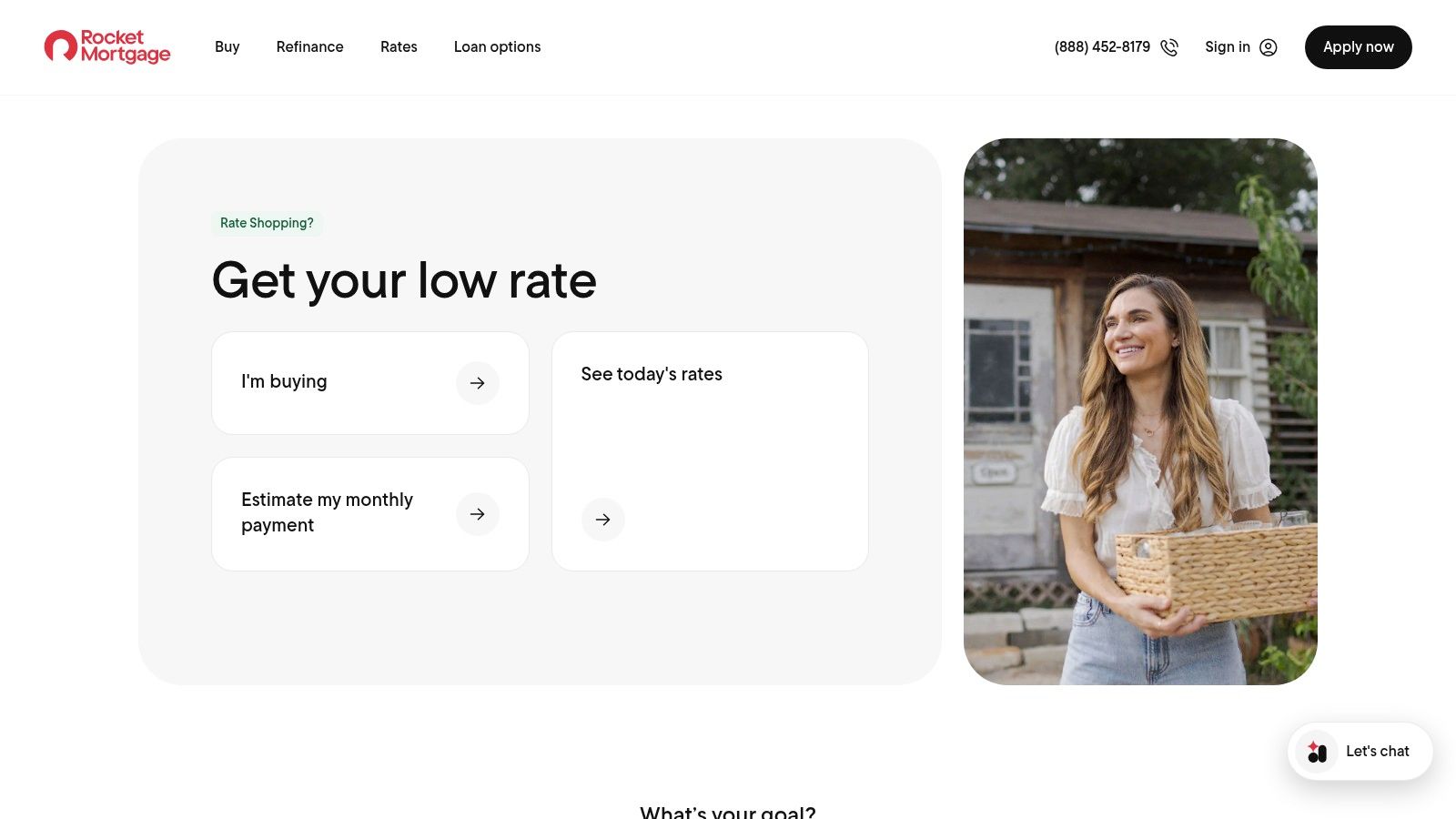
These platforms are engineered for user-friendliness, guiding applicants through each step with clear instructions. This tech-forward approach is a key reason why some digital-first companies are considered among the best mortgage lenders for first time home buyers who want to move quickly and with confidence. You can get preapproved in minutes, giving you a clear budget to work with as you start your home search.
Key Features and User Experience
Digital mortgage platforms are built around powerful online portals and mobile apps. These tools are central to the user experience, allowing you to upload documents, track your loan's progress, and communicate with your loan team seamlessly.
- Verified Approval: This is a step beyond a standard preapproval. By allowing a lender to verify your income and assets electronically, you can receive a much stronger approval letter, making your offer more competitive.
- eClosing: Depending on your state's regulations, you may be able to complete most, if not all, of your closing paperwork online. This feature drastically reduces the time spent at the closing table.
- Diverse Loan Options: Leading lenders offer a wide array of loan products, including Conventional, FHA, and VA loans, ensuring that most first-time buyers will find a suitable option.
Pro Tip: Use a lender's mobile app to stay on top of your to-do list. The app can send push notifications for required documents or status updates, helping you keep the process moving without delays.
Rates, Fees, and Accessibility
While many digital lenders excel in technology and speed, their rates and lender fees may not always be the lowest available. Pricing can vary based on your credit profile and the specifics of your loan, so it's always wise to compare. The experience is primarily online or over the phone, which is perfect for self-sufficient buyers but may be a drawback for those who prefer face-to-face interaction.
Pros & Cons of a Digital-First Approach
| Pros | Cons |
|---|---|
| Streamlined digital process is fast and beginner-friendly. | Rates and lender fees may not be the most competitive. |
| Verified Approval provides a competitive edge for buyers. | Limited physical branches for in-person support. |
| Strong customer support infrastructure and large servicing team. | The experience is mostly digital, which may not suit everyone. |
Ultimately, a tech-savvy approach is an excellent choice for the first-time home buyer who prioritizes convenience and speed. For those seeking more personalized guidance on their journey to homeownership, explore the comprehensive resources available in the first-time homebuyer guide from Residential Acceptance Corporation (RAC Mortgage).
Website: https://www.rocketmortgage.com
3. Prioritizing Transparency and Affordability
Certain online lenders have distinguished themselves in the crowded lending space by prioritizing transparency and affordability. For first-time home buyers who are cost-conscious and appreciate a straightforward, digital-first experience, this model offers a compelling path to homeownership. Its primary appeal is a commitment to eliminating many traditional lender fees, which can save buyers a significant amount of money at closing.
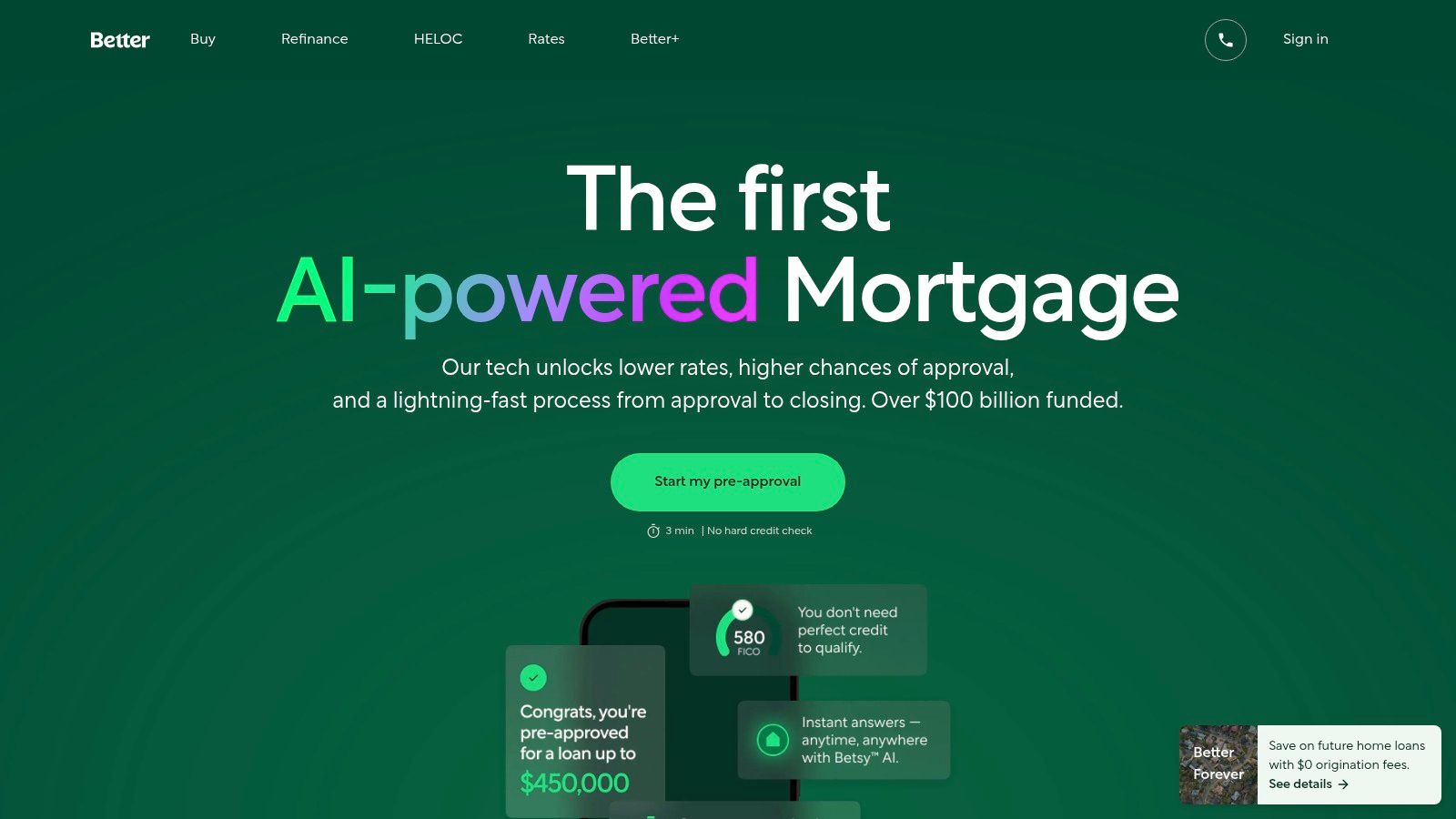
The platform is designed for simplicity and speed, allowing users to get a rate quote and a preapproval letter in minutes, often without needing to speak to a loan officer. This no-pressure approach makes this one of the best mortgage lender models for first time home buyers who want to explore their options independently. By focusing on a low-cost, high-tech model, these lenders empower buyers to understand their budget and borrowing power with clarity.
Key Features and User Experience
The entire process with these lenders is managed through a sleek, intuitive online dashboard. This central hub is where you can compare loan options, upload documents securely, and track your application's progress from start to finish.
- Transparent Fee Structure: The most notable feature is the frequent promotion of no lender origination fees, application fees, or commission fees on many loan products. This can translate to substantial savings for a first-time buyer.
- Instant Rate Quotes: The platform provides real-time, customized rate estimates without requiring a hard credit pull initially. This allows you to see potential rates and monthly payments easily.
- Digital Preapproval: You can complete an application and receive a verified preapproval letter entirely online, often in as little as 20 minutes. This speed can be a major advantage.
Pro Tip: Before committing, use online tools to model different down payment scenarios. Seeing how a larger down payment affects your interest rate and monthly payment can help you make a more informed financial decision.
Rates, Fees, and Accessibility
This type of lender is often highly competitive on rates and a leader in minimizing lender fees. Its all-digital model keeps overhead low, and those savings are often passed to the consumer. However, this online-only approach means there are no physical branches for in-person consultations. Service is handled via phone, email, and the online portal.
Pros & Cons of a Low-Cost Model
| Pros | Cons |
|---|---|
| Simple and clear pricing with no lender origination fees. | No physical branches for in-person support or closings. |
| Quick preapprovals and rate estimates without sales pressure. | Loan programs and availability can vary by state and loan type. |
| The fully digital process is efficient and user-friendly. | The experience is entirely digital, which might not suit everyone. |
Ultimately, a low-cost online lender is a top-tier choice for the budget-conscious first-time home buyer who is comfortable managing their home loan process online. For those looking for more personalized, hands-on guidance, consider the educational resources in the first-time homebuyer guide from Residential Acceptance Corporation (RAC Mortgage).
Website: https://better.com
4. Expertise in Specialized Loan Programs
Some established national lenders combine modern technology with a deep commitment to personalized service. For first-time home buyers who may feel overwhelmed by the mortgage process, these lenders offer a supportive, hands-on approach that sets them apart. Their primary strength lies in expertise with various government-backed and specialized loan programs, making homeownership accessible to a wider range of buyers.
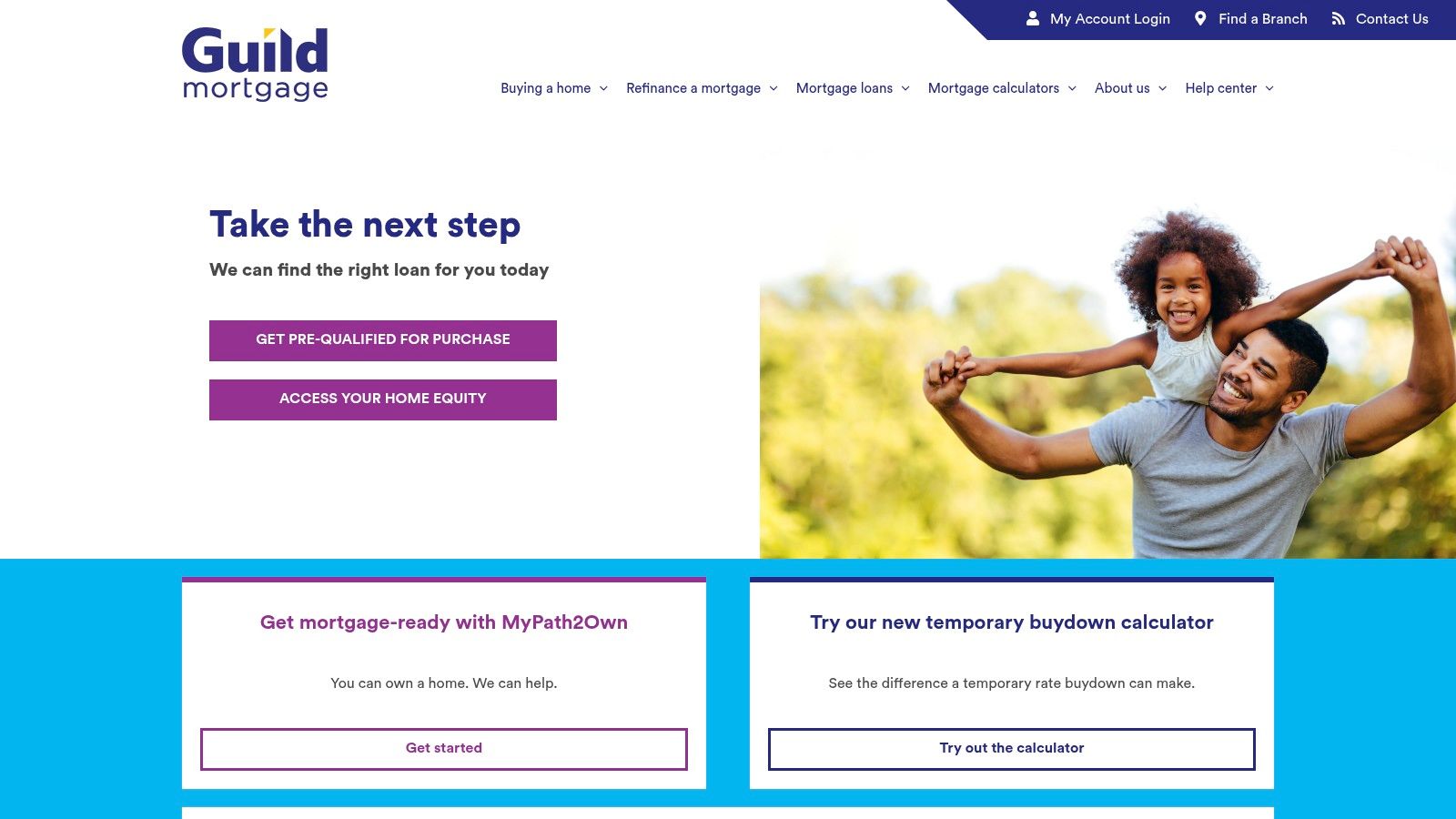
These companies excel at guiding buyers through complex financial landscapes, particularly when it comes to securing financial aid. This focus makes them some of the best mortgage lenders for first time home buyers who need help navigating down payment assistance programs or have unique credit profiles. Their loan officers act as dedicated partners, providing clarity and support from application to closing.
Key Features and User Experience
These lenders often blend a network of physical branches with a capable suite of online tools, offering a hybrid experience that caters to different preferences. Whether you prefer face-to-face meetings or digital convenience, the platform is designed to accommodate your needs.
- Down Payment Assistance Expertise: Many are renowned for their proficiency in identifying and applying for state and local down payment assistance (DPA) programs. Their loan officers are trained to help buyers find grants and forgivable loans.
- Wide Range of Loan Products: Beyond standard Conventional loans, they often offer FHA, VA, and USDA loans, as well as jumbo and renovation loans. This diverse portfolio ensures they can find the right fit for nearly any borrower.
- Personalized Guidance: Unlike fully digital lenders, this model emphasizes the human element. You are paired with a specific loan officer who becomes your primary point of contact, helping you overcome any hurdles.
Pro Tip: Before you even apply, speak with a loan officer about your financial situation. They can provide a preliminary assessment of which DPA programs you might qualify for, giving you a major head start.
Rates, Fees, and Accessibility
With this model, rates and fees are competitive but can vary significantly by branch, market, and loan officer. Because the model is less centralized than that of large online lenders, it is crucial to get a detailed Loan Estimate to understand all associated costs. The mortgage process may also move at a more traditional pace, which can be a drawback for buyers in a rush.
Pros & Cons of a Service-Oriented Lender
| Pros | Cons |
|---|---|
| Strong expertise in low-down-payment and assistance programs. | Rates and fees can vary by branch and may not be the lowest. |
| Personalized human guidance helps overcome buying hurdles. | The mortgage process may be slower than fully online lenders. |
| Wide array of loan types including FHA, VA, and USDA. | Digital tools are functional but may not be as sleek as tech-first platforms. |
Ultimately, a lender with deep program expertise is an excellent choice for first-time buyers who value expert guidance and need assistance with down payment programs. For those looking to understand these powerful financial tools better, you can explore the various down payment assistance programs with Residential Acceptance Corporation (RAC Mortgage).
Website: https://www.guildmortgage.com
5. The Large Bank Advantage
As one of the largest and most established types of lenders, major banks offer a unique blend of digital convenience and traditional, in-person support. For first-time home buyers who value the security of a major financial institution and want the option of face-to-face guidance, these institutions present a compelling choice. They leverage vast resources to provide specialized programs and grants aimed at making homeownership more attainable.
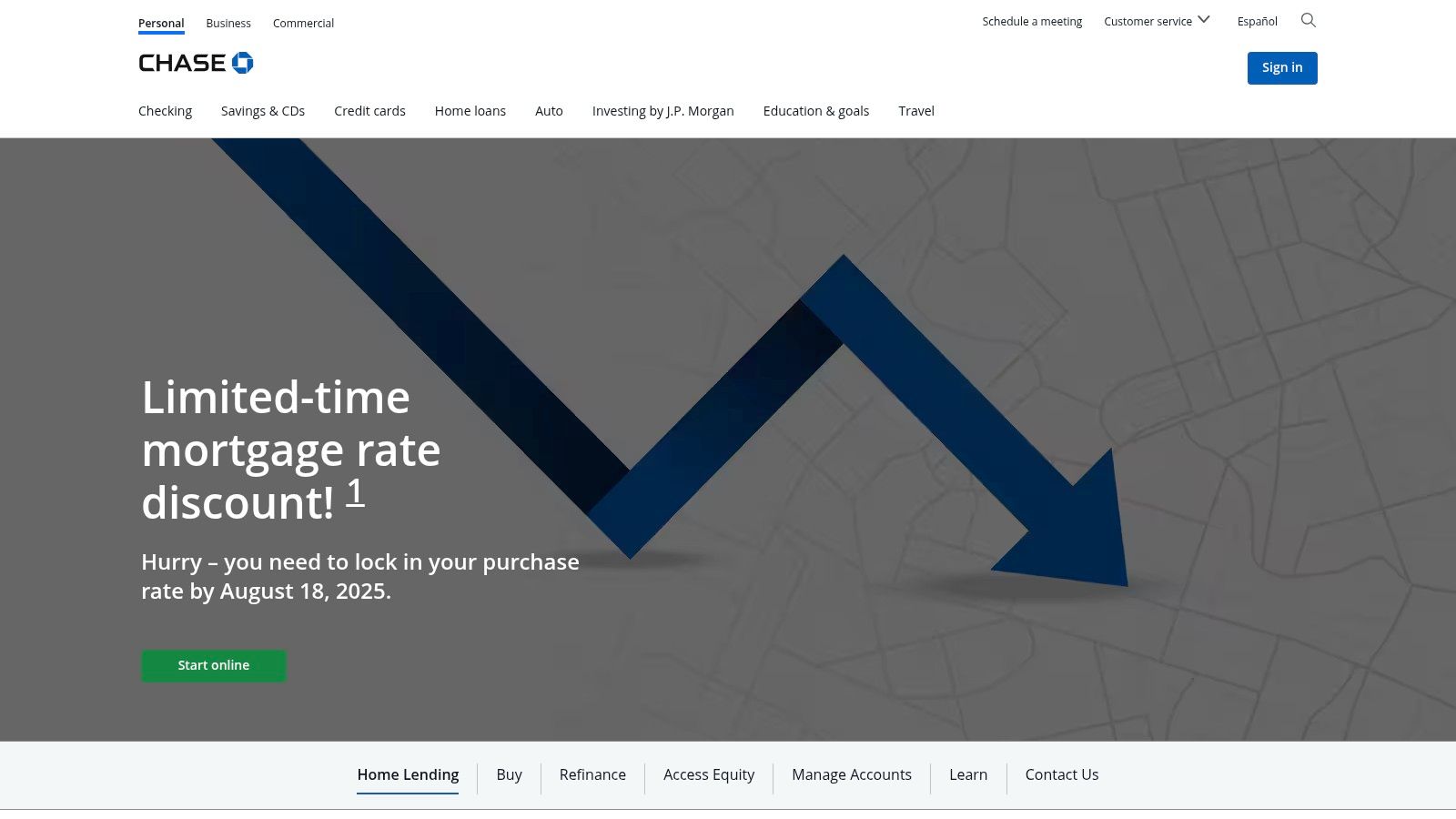
This hybrid approach makes large banks one of the best mortgage lenders for first time home buyers who may start their journey online but want the reassurance of speaking with a loan officer at a local branch. The ability to combine a sophisticated online application with personalized, local expertise provides a balanced and supportive path to securing a first mortgage.
Key Features and User Experience
A large bank's strength lies in its specialized loan products and grant programs designed to lower the barrier to entry for new homeowners. The user experience can be tailored, allowing you to manage your application online or work directly with a home lending advisor.
- Flagship Programs: Many banks have programs that are a major draw for first-time buyers. Eligible applicants can secure a mortgage with a down payment as low as 3%, which can significantly reduce the upfront cash needed.
- Homebuyer Grants: Some offer location-based grants that can be applied toward down payment and closing costs. These funds do not need to be repaid and can provide a substantial financial boost.
- In-Branch Support: With thousands of branches nationwide, you can schedule an appointment to discuss your loan options, get help with your application, and have your questions answered in person.
Pro Tip: If you are an existing customer with a large bank, inquire about relationship benefits. You may be eligible for rate discounts or reduced fees, which can add up to significant savings over the life of your loan.
Rates, Fees, and Accessibility
While these banks offer competitive programs, their interest rates and fees are not always the lowest on the market. It is crucial to get a Loan Estimate and compare it with other lenders. The true value often comes from its grant programs and the convenience of its vast branch network. Accessibility is a major advantage.
Pros & Cons of a Large Bank
| Pros | Cons |
|---|---|
| Large branch network offers robust in-person support. | Eligibility rules for grants and low-down-payment programs can be complex. |
| Potential benefits and discounts for existing customers. | Rates and fees may not be the most competitive; comparison is key. |
| Specialized loans and grants can make homebuying more affordable. | The application process may feel less streamlined than digital-only lenders. |
Ultimately, a major bank is an excellent option for first-time buyers who prefer stability and want access to both digital tools and in-person support. For those looking for more flexible and personalized loan solutions, the experts at Residential Acceptance Corporation (RAC Mortgage) can provide tailored guidance.
Website: https://www.chase.com/personal/mortgage
6. The Online Marketplace Model
An online marketplace operates not as a direct lender but as a powerful tool for first-time home buyers. Instead of applying to multiple lenders one by one, users can submit a single, streamlined application and receive competing mortgage offers from a vast network of lenders. This approach demystifies the rate-shopping process, making it easier to compare offers and understand the financial landscape.
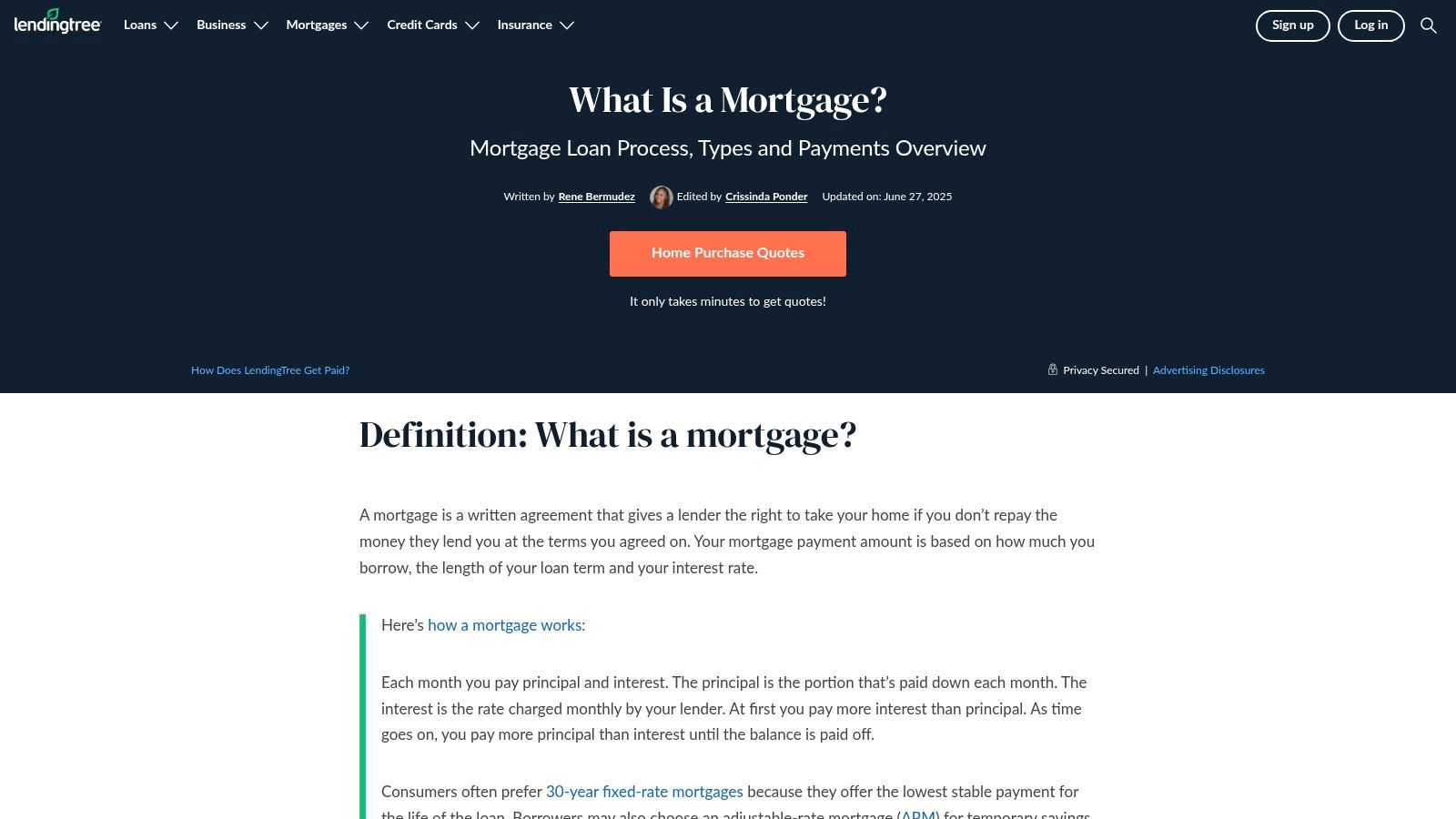
The platform’s core strength is empowering buyers with information and choice, helping them find competitive rates and terms that fit their budget. By presenting offers side-by-side, this model is one of the best for first time home buyers who want to ensure they are getting a great deal without the legwork of contacting dozens of companies individually.
Key Features and User Experience
This user experience is centered on comparison and education. The platform guides you through its application and then organizes the resulting lender offers in a clear, easy-to-digest format, allowing for an apples-to-apples comparison.
- Side-by-Side Offer Comparison: This is the hallmark feature. You can quickly see estimated interest rates, APRs, monthly payments, and closing costs from multiple lenders at once.
- Loan Filtering: Users can easily filter for specific loan types that are popular with first-time buyers, such as FHA loans or conventional loans with low down payment requirements.
- Financial Tools and Guidance: The site offers a suite of free tools, including mortgage calculators and credit score guidance, to help you prepare your finances for a home purchase.
Pro Tip: When you receive offers, pay close attention to the Loan Estimate documents provided by each lender. Look beyond the interest rate and compare lender fees, points, and third-party closing costs to understand the true cost of each loan.
Rates, Fees, and Accessibility
The primary benefit of a marketplace is its ability to source competitive rates by making lenders compete for your business. However, the quality of the experience can vary depending on the lenders you are matched with. After submitting your information, you can expect to be contacted by multiple loan officers. While this is part of the process, it can feel overwhelming for some.
Pros & Cons of a Marketplace
| Pros | Cons |
|---|---|
| Time-saving platform to find competitive rates from many lenders. | Users may receive numerous follow-up calls and emails. |
| Helps users understand the range of possible offers and fees. | Not all local or smaller lenders participate in the network. |
| Free to use for borrowers. | The final experience depends on the specific lender you choose. |
Ultimately, a marketplace is a fantastic starting point for first-time buyers who want to cast a wide net and compare their options efficiently. Once you have a few offers, you'll be in a stronger position to make an informed decision and move forward. For more insight into this crucial first step, see this guide on how to get preapproved from Residential Acceptance Corporation (RAC Mortgage).
Website: https://www.lendingtree.com/mortgage/
7. The Online Research Hub
An online research hub isn't a direct lender but has established itself as an indispensable resource for the modern home buyer. For first-time buyers overwhelmed by the sheer number of lending options, these hubs act as a trusted guide, offering clear, unbiased comparisons and educational resources. Their primary strength is simplifying the complex world of mortgages, making them one of the best starting points for anyone new to the process.
The platform provides curated lists, in-depth reviews, and easy-to-understand guides on everything from FHA loans to current mortgage rate trends. This educational focus empowers you to understand the landscape before you even speak to a loan officer. By presenting information in a digestible format, these sites help demystify the mortgage process and build the confidence needed to make a sound financial decision.
Key Features and User Experience
The user experience of a research hub is designed around clarity and education. The website is clean, easy to navigate, and free from high-pressure sales tactics. It allows you to compare top lenders side-by-side based on criteria that matter most to first-time buyers.
- Curated "Best Of" Lists: The site features regularly updated lists, such as "Best Mortgage Lenders for First-Time Home Buyers," which do the initial legwork of vetting lenders for you. Each lender is reviewed based on rates, fees, loan options, and customer experience.
- Comprehensive Educational Guides: From articles explaining closing costs to calculators that estimate your monthly payment, the platform is packed with tools designed to answer your questions.
- Direct Application Links: Once you’ve narrowed down your choices, the hub provides direct links to lenders' websites, streamlining the transition from research to application.
Pro Tip: Use a research hub's mortgage calculators to run different scenarios. Adjusting the down payment, loan term, and interest rate will give you a realistic picture of your budget and help you determine what you can comfortably afford.
Rates, Fees, and Accessibility
As an informational platform, these hubs do not set rates or charge fees. Instead, they present the rates and fees published by partner lenders. While the platform strives for transparency, it's important to remember that featured partners may receive more prominent placement. The real value lies in using the platform as a comparative tool before engaging directly with a lender.
Pros & Cons of a Research Hub
| Pros | Cons |
|---|---|
| Plain-English, transparent comparisons to help narrow choices. | Not a direct lender; you must apply through partner lenders. |
| Educational content specifically tailored for new homebuyers. | Featured partners may receive more prominent placement. |
| Excellent starting point for research and lender discovery. | Rates shown are estimates and require direct verification. |
Ultimately, a research hub is a powerful educational ally for any first-time home buyer looking to get their bearings. Once you’ve used it to understand your options, taking the next step with a dedicated lending expert can provide the personalized guidance you need. To dive deeper, explore the resources in the first-time homebuyer guide from Residential Acceptance Corporation (RAC Mortgage).
Website: https://www.nerdwallet.com/best/mortgages
Top 7 Mortgage Lenders Comparison for First-Time Buyers
| Mortgage Provider | Implementation Complexity 🔄 | Resource Requirements ⚡ | Expected Outcomes 📊 | Ideal Use Cases 💡 | Key Advantages ⭐ |
|---|---|---|---|---|---|
| Residential Acceptance Corporation | Moderate complexity with hybrid online & personal guidance | Moderate resources with broker tools and underwriting support | Fast loan closings (18-20 days), reliable approvals | Diverse borrower profiles, brokers needing support | Wide loan variety, strong broker support, personalized service |
| Rocket Mortgage | Low complexity; fully digital streamlined process | Low resource demand; app and eClosing available | Quick preapprovals and application processing | First-time buyers seeking fast, simple online loans | Tech-forward, beginner-friendly, large servicing footprint |
| Better Mortgage | Very low complexity; fully digital | Minimal resources; no branches, online-only | Fast application and clear pricing | Fee-sensitive, speed-focused first-time buyers | Transparent pricing, no lender fees advertised |
| Guild Mortgage | Moderate complexity; mix of branch and digital | Higher resource use with in-branch support | Personalized guidance, slower process | Buyers needing down payment assistance and help | Expertise in assistance programs, hands-on guidance |
| Chase (Chase Home Lending) | Moderate complexity; combined branch and digital | High resource use; large branch network | Access to grants, in-person support | Buyers valuing in-branch help and bank benefits | Extensive branch access, specialized loan programs |
| LendingTree | Low complexity; online marketplace platform | Low resources; aggregates lender offers | Multiple offers for comparison | Buyers wanting to compare multiple mortgage options | Time-saving comparisons, first-time buyer filters |
| NerdWallet | Very low complexity; editorial and referral platform | Minimal resources; content creation and curation | Informed lender choices through education | Buyers needing guidance and lender reviews | Clear comparisons, educational content, curated lists |
Taking the Next Step Towards Your First Home
Navigating the landscape of mortgage lenders can feel overwhelming, but your journey to homeownership is a marathon, not a sprint. This guide has provided a detailed look at some of the best mortgage lenders for first time home buyers, examining various models from large national banks to digital-first innovators and comprehensive marketplaces. Each option presents a unique set of advantages and potential drawbacks, tailored to different borrower profiles.
The key takeaway is that there is no single "best" lender for everyone. The ideal choice hinges entirely on your personal circumstances, your communication preferences, and your specific financial needs. Your task now is to transform this knowledge into decisive action, moving from research to application with clarity and confidence.
Synthesizing Your Options: From Information to Decision
As you reflect on the lender models we've covered, it's crucial to distill the information down to what matters most for you. Think of this process as creating a personal scorecard for each potential lending partner.
- For the Tech-Savvy Buyer: If your priority is a streamlined, digital-first experience with minimal human interaction, a platform focused on automation might seem appealing. Their systems are designed for speed and efficiency, which is ideal for borrowers with straightforward financial profiles who value convenience.
- For the Relationship-Oriented Buyer: If you value personalized guidance, want to ask detailed questions, and prefer having a dedicated expert to call, a lender like Residential Acceptance Corporation (RAC) will likely be a better fit. Their model is built on providing hands-on support, which is invaluable when navigating complex situations like low down payments, credit concerns, or non-traditional income.
- For the Comparison Shopper: If your primary goal is to secure the lowest possible interest rate by comparing multiple offers at once, aggregator platforms serve as excellent starting points. These tools provide a broad market overview, helping you benchmark quotes before committing to a specific lender.
Your Actionable First-Time Home Buyer Checklist
Choosing a lender is the most critical financial decision you will make in the homebuying process. Don't rush it. Use the following steps to methodically narrow down your choices and find the perfect partner for your journey.
- Define Your Non-Negotiables: Before you speak to any loan officer, create a list of your absolute must-haves. Is it a specific loan program like FHA or VA? Is it the ability to close in under 30 days? Is it having a dedicated person to guide you through every step? This list will be your north star.
- Conduct an "Interview": Treat your initial conversations with lenders like a job interview, where you are the hiring manager. Ask pointed questions based on what you've learned. How do they handle communication? What are their average closing times for first-time buyers? What specialized programs do they offer that might benefit you?
- Compare Loan Estimates (LEs) Apples-to-Apples: Once you apply, you will receive official Loan Estimates. This document is standardized by the government for a reason: it allows for direct comparison. Look beyond the interest rate and scrutinize Section A (Origination Charges) and other lender fees. A lower rate can sometimes be offset by higher closing costs.
- Trust Your Gut: A mortgage is a long-term partnership. The lender you choose should make you feel confident and supported, not stressed or confused. If you feel pressured, ignored, or rushed during the initial stages, it’s a major red flag. The best lenders invest in educating and empowering you.
Ultimately, the journey to finding one of the best mortgage lenders for first time home buyers is deeply personal. It requires you to balance digital convenience with the irreplaceable value of human expertise. For many first-time buyers, especially those with unique financial profiles or a desire for a trusted advisor, the personalized approach offered by specialists like RAC Mortgage provides the ideal combination of modern tools and dedicated support. By taking a thoughtful, measured approach, you can secure a mortgage that not only gets you the keys to your new home but also sets you up for long-term financial success.
Ready to partner with a lender that specializes in guiding first-time home buyers with personalized care and a wide array of loan options? The experts at Residential Acceptance Corporation are committed to making your homeownership dream a reality through dedicated support and tailored financing solutions. Start your journey with a team that puts you first by visiting Residential Acceptance Corporation for a no-obligation consultation today.
